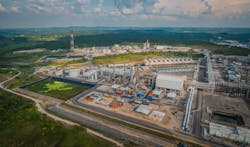Braskem Idesa, Emerson collaborate on excellence, sustainability
To improve safety and reliability while reducing energy consumption and emissions, Emerson reported Oct. 18 that it’s partnering with Braskem Idesa to provide digital automation technologies and engineering services to meet business performance metrics and achieve its sustainability goals. Braskem Idesa is a joint venture of Brazil-based Braskem, the largest producer of thermoplastic resins in the Americas, and Grupo Idesa, one of the biggest petrochemical companies in Mexico.
Braskem Idesa’s multi-year digital transformation will leverage Emerson’s petrochemical industry expertise, automation technology and software to improve operations and support its goal of reducing Scope 1 and 2 greenhouse gas emissions (GHG) by 15% by 2028 and achieve full carbon neutrality by 2050.
“We identified several key financial and performance benchmarks, and brought Emerson on board to participate in creating a digital transformation strategy for achieving top-quartile results,” says Stefan Lepecki, CEO of Braskem Idesa. “Having a well-defined path forward has given us the confidence to pursue our sustainability and performance goals with advanced, integrated technologies that help us support market demands.”
Taking advantage of Emerson’s Operational Certainty methodology, Braskem Idesa’s roadmap provides a framework for scalable improvements in four key transformation work streams:
- Information management, including creating a data architecture for real-time KPIs and decision-making.
- Physical loss control, with enhanced energy management and loss control systems.
- Production and energy optimization with advanced control technologies.
- Reliability and energy efficiency using data analytics, continuous emissions monitoring systems, LED lights and fugitive emissions reductions.
These work streams align with Braskem Idesa’s three-pronged strategy for reducing GHG emissions through energy efficiency, renewable energy use and low-intensity carbon process technologies; renewable feedstocks and post-consumer recycling; and capturing carbon emissions to use as raw materials, value-added chemicals and as an alternative to future carbon taxes.
“Successful leaders are realizing that sustainability initiatives are also good business,” adds Mark Bulanda, executive president of Emerson’s Automation Solutions business. “Reducing waste and unnecessary raw material consumption, lowering energy costs and driving profitability, all while improving environmental sustainability, is possible with the right focus and resolve.”
About the Author

Leaders relevant to this article:

